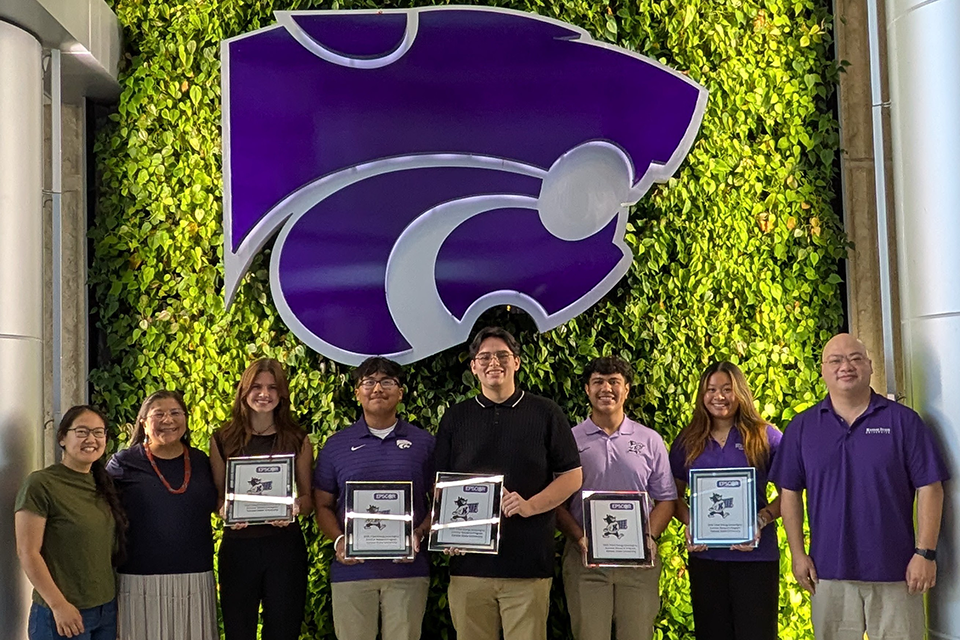Undergraduates partner with Prairie Band Potawatomi Nation on renewable energy solutions

Pictured left to right: Mariah Dray, LaVerne Bitsie-Baldwin, Maddie Harp, Samuel Largo, Wilburn Wabaunsee, Diego Sanchez, Vivian Nguyen and Hongyu Wu.
Kansas State University faculty members, Hongyu Wu, associate professor in the Mike Wiegers department of electrical and computer engineering, LaVerne Bitsie-Baldwin and Mariah Dray in the department of horticulture and natural resources, hosted five undergraduates for a six-week summer research experience through the National Science Foundation's Established Program to Stimulate Competitive Research, or EPSCoR. Students collaborated with faculty and the Prairie Band Potawatomi Nation to design renewable energy solutions that strengthen Tribal energy sovereignty.
The program is part of a $20 million NSF Track-1 EPSCoR award, "Sustainable Engineering Infrastructures and Solutions for Tribal Energy Sovereignty," that spans 2022 to 2027. The multi-institutional project includes K-State, the University of North Dakota and North Dakota State University, each partnered with a Tribal Nation and a Tribal college. K-State partners with the Prairie Band Potawatomi Nation and Haskell Indian Nations University.
Applied research in action
The student teams focused their research on the Prairie Band Potawatomi Boys and Girls Club in Mayetta. One team developed machine learning models to forecast solar irradiance using local weather and environmental data, aiming to improve solar energy planning and operational decision-making. The second team designed a solar-plus-battery microgrid system tailored for the facility, incorporating solar resource assessment, system sizing, energy storage design and load analysis to improve energy reliability and resilience.
Both projects were developed with input from Tribal representatives, ensuring the research was community-informed, technically robust and aligned with the Nation's broader goals for sustainability and energy independence.
Expanding student learning
To prepare for their projects, students attended presentations and workshops on topics including library resources, cybersecurity and data security, science communication, graphic design, and the work of the K-State Pollution Prevention Institute. They also participated in a site visit to the Prairie Band Potawatomi Nation to learn directly about Tribal energy sovereignty.
“The resources provided by each partner were integral to understanding complex systems and community engagement,” said Hongyu Wu, associate professor in the Mike Wiegers Department of Electrical and Computer Engineering.
2025 research team
K-State student researchers included:
- Madeline Harp, junior in computer science and mathematics, Lee's Summit, Missouri.
- Samuel Largo, senior in accounting and data analytics, Manhattan.
- Vivian Nguyen, sophomore in mechanical engineering and physics, Dodge City.
- Diego Sanchez, sophomore in electrical engineering, Great Bend.
- Wilburn Wabaunsee, sophomore in environmental science, Tulsa, Oklahoma.
Building future capacity
EPSCoR is designed to build research capacity and workforce development in states that have historically received less federal research funding. Kansas is one of 28 EPSCoR jurisdictions. Through applied learning experiences like this one, undergraduates gain hands-on research skills while contributing to the Prairie Band Potawatomi Nation’s long-term goals for renewable energy and sovereignty.